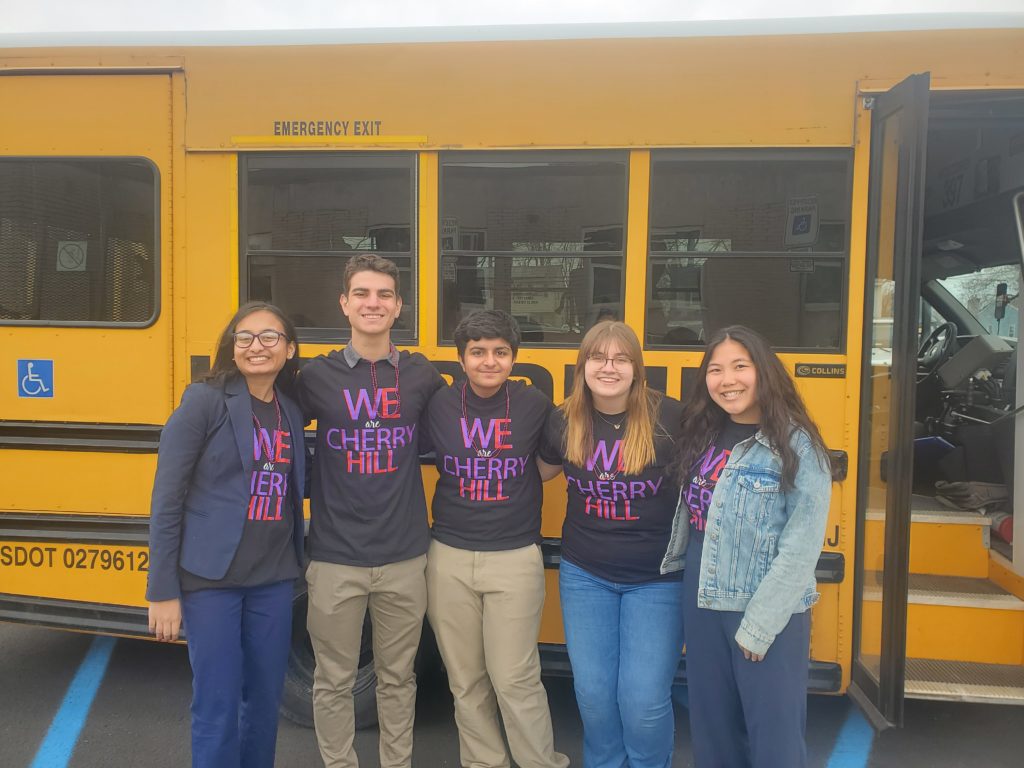
Students were among those who rallied for fair funding in Trenton after a state aid decrease was discussed at two board of ed meetings this month. Pictured from left to right are Cherry Hill East seniors board of education representative alternative Gia Gupta and board of ed rep Matthew Rentezelas, East’s Sophomore Class President Ronak Pathak, Cherry Hill East junior board of education representative alternative Aaralyn Camp and senior Crystal Yeh, Cherry Hill East student body president.
A group of 60 Cherry Hill students, community members and staff went to Trenton on March 20 to attend a state Assembly public hearing and advocate for fair funding, after the school district got news last month that it would face a $6.9-million decrease in state aid between the current school year and the next.
The reduction was discussed at both the March 12 and March 19 board of education meetings. As of March 21, the tax impact on residents for the general fund is expected to increase by $194.71, nearly $127 of it the result of a 2% hike and the spending growth limitation adjustment for health benefits (SGLA). The rest – nearly $68 – comes from the use of banked cap for the average assessed home of $226,922.
The news was a blow to residents already experiencing a tax increase due to the passage of the $363-million bond referendum two years ago. For debt service aid, the tax impact for 2024-’25 is expected to be $101.38, a number expected to increase through 2026-’27, when it will begin to decline.
With both the debt service aid from the bond referendum and the general fund tax increase, residents are looking at a total increase of $296.09.
“As I’ve said in a previous meeting, I’m very concerned with the thought process of taxing our way out of this,” said Laurie Neary, a resident and former board of education member. “This problem is a problem with the equalization aid and the way in which they view income, so this will be our problem next year, and the year after that, and the year after that and so on, until the formula is addressed and we look at the equalization aid and how that is calculated and how our income is calculated.”
Board President Miriam Stern emphasized that the district has been severely underfunded for more than a decade.
“When I say severe, I mean we were getting 50% or less than our allotted state aid, and because of that, we have already made a lot of cuts over the years, and also stopped being able to make upgrades,” she explained.
” … We were finally on our way after S2 (a state aid bill) passed in 2018 to full funding,” Stern added. “Last year, we got almost a $7-million increase, and this year we lost $7 million. So that’s a $14-million swing from this year to the next.”
Neary and Ilana Yares, chair of the district’s Fair Funding Committee, both expressed concerns over how the cuts in state aid would impact special education students. New in the school budget this year is an additional special ed class at both Carusi Middle School and East High. Capital reserve projects approved in the preliminary budget total $3 million.
“We talked about making sure that we’re focusing on projects that need to be done,” Business Administrator Lynn Shugars noted. “I would say the top ones on this list are the backflow preventions, (removal of the) underground storage tanks and replacement of the fire-alarm system (at Malberg) and … the ductless split systems need to be done.”
At the special budget meeting on March 19, Shugars explained that the cuts made for personnel were for positions that were either current vacancies or retirements that would result in vacancies, as well as program relocations and non-personnel issues such as “equipment, supplies, technology, furniture and athletics.”
Superintendent Dr. Kwame Morton explained that although the district got more funding for certain items like preschool expansion, that money can’t be used for the general fund budget and can’t cover things like transportation – which would continue to increase depending on student numbers – or special education, since the funding is separate.
From now until April’s public hearing on the budget, Morton explained that it is still possible legislators will address community concerns and propose bills or additional funding so the district can avoid more cuts. He released two public statements that are on the district website.
The full budget hearing and other board meetings are on the district YouTube site.


